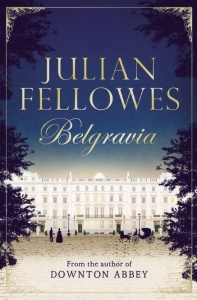It’s maybe been a while since I mentioned that I loved Downton Abbey. I mean, it was a popular show, I’m not alone in this. The show definitely also sent me scurrying after related reading material. That’s how I came to read Lady Almina and the Real Downtown Abbey: The Lost Legacy of Highclere Castle, and then Lady Catherine and the Real Downton Abbey, and even Below Stairs, which really led to Serving Victoria.
Downton Abbey’s creator, Julian Fellowes, had a follow up show where he visits famous estates and digs around to find out some of the more interesting stories. It’s called Great Houses with Julian Fellowes and it’s awesome.
Recently, I read his new book, Belgravia.

Belgravia opens on the eve of the Battle of Waterloo, at the Duchess of Richmond’s ball in Brussels. The next day many of the guests go off to fight in the battle; many of them do not return. We meet the Trenchard family – James, his wife Anne and their beautiful daughter Sophia. James is a supplier to the army and his fortunes have been climbing as he’s able to achieve what most cannot. They manage to get an invite to the ball via Sophia’s relationship with Lord Bellasis, a favourite nephew of the Duchess of Richmond.
In a time when social rules dictated who could marry whom, Sophia is not a ‘good’ match for Lord Bellasis – her father works.
The rest of the story takes place in London in the 1840s, when those heady days in Brussels changes everything for these families.
I know – I’m being vague again. But the enjoyment of this book relies on one not knowing very much going in.
Here’s what’s interesting about Belgravia: yes, you can read it in traditional book format, but originally it was released as a serialization, both text and audio, via an app! The book very much reads this way – each chapter feels episodic, there are cliffhangers, and I ended up speeding through the 402 pages.
Otherwise, this book was eminently readable. There is no one better when it comes to this type of historical feature. Fellowes has an incredible depth of knowledge when it comes to society, the relationships therein, the changes as a new class of wealth showed up on the scene intent on mingling with the top echelons of English Society, as well as the dynamics of service at the time. The characters feel like real people and Fellowes writes for an audience that he knows is capable of following along. He doesn’t write down to you, he doesn’t affect jargon of the time to try and lend his work more credibility. It just is credible. Even watching him on Great Houses, I’m always struck by how polite he is, how respectful he is of everyone he interacts with.
Perhaps that shouldn’t be notable, but it totally is.
If you miss Downton, this should fill the void.

This sounds fantastic! I’ll need to check it out. I’ve never been an avid Downton Abbey fan, but I enjoy watching it from time to time.
You only watch it from time to time?!?? How do you know what’s happening???
Haha I don’t, is the short answer. But I try!
I definitely have to check this out. I recently watched his new mini-series Dr. Thorne on Amazon, and it was fun. Have you read “Snobs” by him? I thought it was only okay, but provided a decent enough distraction.
I did read Snobs and I agree with you – was just OK for me! Belgravia was WAAAAAY better.
I’m afraid to admit I’ve only seen the first two episodes. We really need to start watching. I’m totally sending this post to my mom and my boss for Post-Downton recovery though!
But you still have so much to look forward to!
I do love Downton Abbey, even though I’ve only seen some of it. But, the fact that I have watched it at all is saying something, because I rarely watch TV shows. I didn’t know its creator had written a book. The style of it sounds intriguing!
Downton is so good. I miss it! This was a good surprise – I didn’t know about the app or serialization, just saw the book in store one day.
I guess if you can’t have the real Downton Abbey, this might be the next best thing. 🙂 Is it a complete book in itself, or do you think he’ll write a sequel to it?
It feels like a complete book but I think there is room for more if he chooses to write it.
I’ve only seen the first two seasons, and I’ve seen the first episode about five times, because I keep intending to rewatch and then continue watching, but then I get stopped after the first one (no good reason). Maybe I’ll try again now that you’ve gotten me thinking about it once more. Do you like the “upstairs” aspect more than the “downstairs” aspect of the stories? Or is it the combo?
It’s definitely the combination. The way that they interact with each other, how their views differ, and how history changes both of their “places”. I think it’s unique to Fellowes’ work and I so enjoy it.
Fellowes is so popular on the UK side of the ocean, and I can totally understand why. He just gets it. He does scandal but he does it smart. Nothing is better then hearing him on the BBC.
Yes!! It’s not trashy scandal. There’s something about him when you see him on TV. He’s mesmerizing in a way an old, white, bald guy probably shouldn’t be.